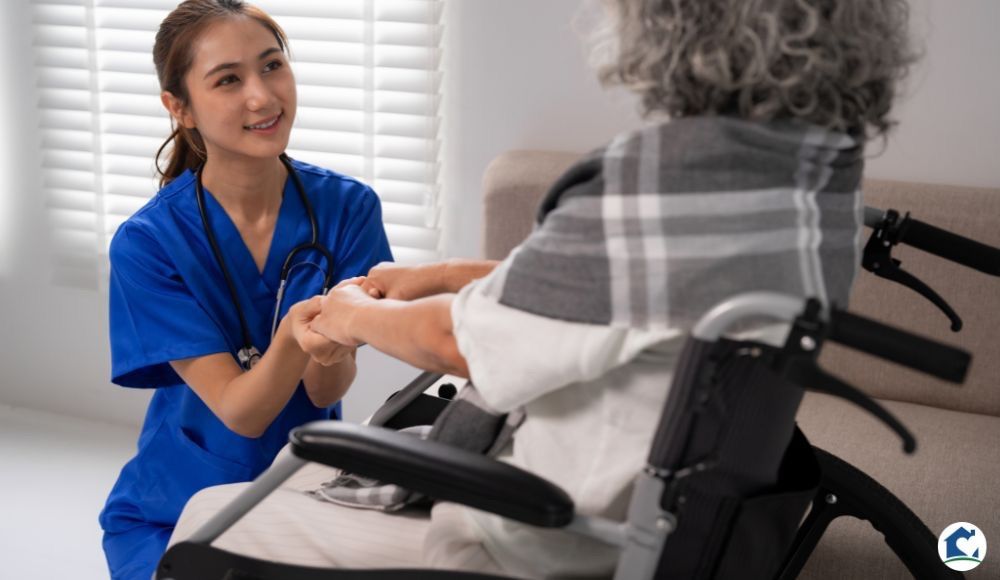Caregiver Self-Care Tips
If you've ever been on a plane, you've heard the flight attendant's pre-flight safety instructions, including the part about oxygen masks. It goes something like this, "In the event of a sudden loss in cabin pressure, oxygen masks will drop from the overhead compartments. Place the mask over your mouth and nose. Pull the strings to tighten the mask. Be sure to put your own oxygen mask on first before helping others."
This is an excellent analogy for the importance of caregivers caring for themselves before caring for others. Hopefully, if you are a caregiver, you're putting the oxygen mask on before your life begins to spiral out of control and crash.
"Evidence shows that most caregivers are ill-prepared for their role and provide care with little or no support, yet more than one-third of caregivers continue to provide intense care to others while suffering from poor health themselves," the Family Caregiver Alliance (FCA) reports. Research shows that many caregivers are less likely to engage in preventative health behaviors, suffer from depression, high levels of stress, diminished immune responses, "increased rates of physical ailments (including [heart disease,] acid reflux, headaches, and pain/aching), increased tendency to develop serious illness, and have high levels of obesity and bodily pain."
10 Caregiver Self-Care Tips
- Let go of the Guilt
Guilt can come in many forms. You may feel guilty about decisions you've made, things you've done or haven't done, emotions you're feeling, not spending enough time with your aging loved one, not spending time with your children or spouse, falling behind at work, and so on. Experts say a certain amount of guilt is good because it shows that your moral compass is working well, but guilt can also be unhelpful and unhealthy. Here are nine steps to help you let go of guilt.
- Prioritize Nutrition
Good nutrition is crucial for everyone's health and well-being, but when you're busy caring for someone else, it's all too easy to turn to fast food and eat junk food to try to alleviate stress. Try limiting your consumption of coffee, soda, and alcohol, drinking eight to ten glasses of water daily, avoiding processed sugar and carbohydrates, and eating lots of fruits and vegetables.
- Get Enough Sleep
Sleep is vital to health and well-being; however, the Centers for Disease Control and Prevention (CDC) reports, "A third of U.S. adults report that they usually get less than the recommended amount of sleep." If you want to provide the best care for your loved one, do your best to get seven to nine hours of sleep per night.
- Manage Stress
Taking care of an aging loved one can be a very rewarding experience, but it can also cause a lot of stress. Chronic stress can harm you both mentally and physically. Mentally, stress can cause anxiety, sadness, irritability, aggression, memory or concentration problems, and more. Physically, stress can cause headaches, tense muscles, stomach issues and increase your risk of hypertension, heart attack, or stroke. Ideally, you need to figure out a way to manage stress before it begins to affect your health and your ability to care for your loved one. - Stretch
Stretching offers many benefits, from strengthening muscles, decreasing chronic pain, and protecting joint and muscle health to increasing serotonin levels, reducing stress, and improving your quality of life. Stretching with your aging loved one will benefit both of you. - Practice Meditation or Other Mindfulness Practices
One way to manage stress is through meditation and mindful practices, and fortunately, they don't have to take a lot of your time. Just a few minutes a day could make all the difference.
- Stay Active
Again, staying active is essential for everyone's health and well-being, but it becomes even more crucial if you are a caregiver. And staying active doesn't have to mean hours at the gym. Walking around the neighborhood, dancing to your favorite song, riding a stationary bike while watching TV, working in the garden, etc., can help keep you active. And again, if you can include your aging loved one in the activity, it will benefit both of you.
- Make Time for Yourself
Not every minute of every day needs to be spent caring for others, working, cleaning the house, etc., and taking time to refresh and re-energize is not selfish; it's smart. Take time to enjoy a hobby, read books, spend time with friends, sit in a park and listen to the birds, play with your dog, listen to music, or whatever makes you happy.
- Join a Caregiver Support Group
Sometimes, expressing your feelings and concerns can make you feel better and less stressed. In a caregiver support group, you can share your experiences and express your feelings and concerns with others struggling with many of the same issues.
- Ask for Help
There are many reasons people don't ask for help when they need it. They may feel like a nuisance, worry about appearing weak, or a myriad of other reasons. However, research finds that people want to help more than we realize.
Help for Family Caregivers
Remember that you are never alone. Comforting Home Care by Phoebe can help. We offer hourly care, 24-hour care, cancer home recovery, family helping family, MS care, Alzheimer's and dementia care, home transition care, and senior transportation.
Give us a call today at 610-625-5206, or connect with us online.












